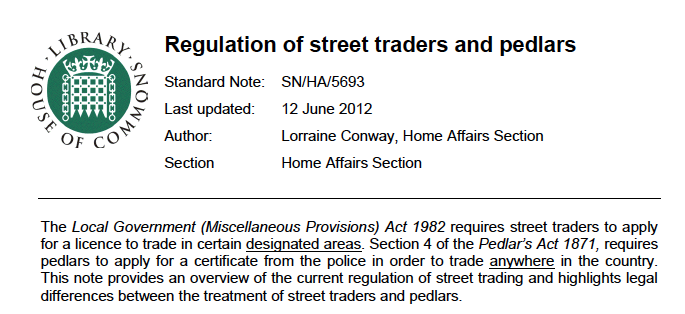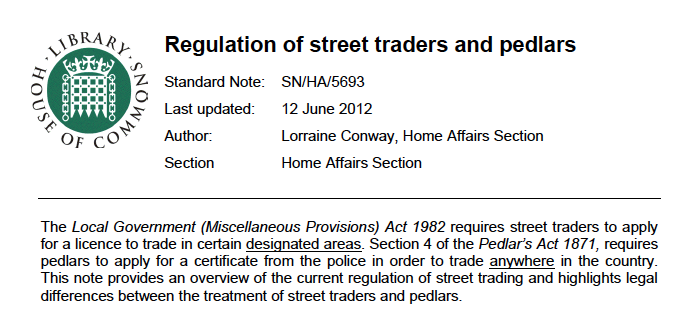5 November 2013 – HC Library Reference Paper SN/HA/5693 – rebuttal

HC Library Reference Paper SN/HA/5693 – rebuttal
5 November 2013 by pedlars.info
The following rebuttal of Standard Note SN/HA/5693 is a critique intended for the greater good of MP’s information as recommended by the CCP Team leader at BIS:
On 21 October 2013, at 11:50 BIS CCP wrote:
“I am not aware of any further HC Library articles. Good luck with the rebuttal – it is important that decision makers are given the full picture before making policy and legislation”.
The HC Library article referred to by CCP/BIS is available online here – with the opening page heading copied herewith –

Pedlars contend that the title of this Standard Note misleads the reader
As an important HC Library reference document it fails to provide introductory principles differentiating two distinct trading disciplines between that of the national certification of pedlars and local licensing of locally designated street traders.
Pedlars contend that to include pedlars within “Regulation of street traders” is both anomalous and wrong in law.
Pedlars clearly affected by statements made in this Standard Note submit that these two types of trading: that of being a pedlar trading in a street and that of designated street trader – are not incompatible and it is the purpose of this rebuttal to challenge the presumption that both these distinct trading activities be restricted only within regulation of licensed street trading legislation and that each activity has exact coterminous commonality.
The only commonality in both certified and licensed trading is merely the description “selling or exposing goods for sale” but the author of the Standard Note fails to explain the principle difference between certified pedlary and that of licensed street trading.
The author provides no background context for a reader to understand why different legislation exists.
The author fails to explain that in generic terms a pedlar is also a trader in the street and can be described as a street trader.
This imprecise use of language is cause for confusion – intended or otherwise but most likely driven by HMG/BIS algorithmic policy deriving system.
The Principle
The principle of Certified Pedlary is to enable common law privilege to any eligible pedestrian person to trade throughout the United Kingdom within the law and with freedom of trade based on individual decisions.
A pedlar is self-regulating as with any other pedestrian on a street. The only difference from any other person on a street is that a pedlar’s certificate enables a pedestrian to carry on trade in public.
The principle of local Licensed Street Trading is to enable trading from a large-scale static apparatus that could cause public safety concern because of obstruction to the highway. Any such public liability demands strict control under local regulation.
The principle of self-regulation in the Pedlars Act cannot be likened to the conditions of statutory regulation but local authorities have been campaigning over three decades to restrict all trading competition in a street regardless of the House of Lords finding that what is fair or not fair competition is outside the remit of local authorities.
Pedlary is a national civil liberty and that is why parliament legislates that “acting as a pedlar is not street trading” for the purposes of regulating local static licensed traders under the Local Government (Miscellaneous Provisions) Act and the London Local Authorities Act.
Therefore this Standard Note set out with an anomalous, contradictory title indicates flawed research or perhaps a perverse influence with invidious intent to confuse.
A more instructive purpose would have the title as:
“Reform to licensed trading and of certified pedlary”
or
“Reform of ambulant and static street trading”.
Heading the Note with the composite of street traders and pedlars “Regulation” and then opening the first paragraph of the Note with attention being drawn immediately to requirements for licensed street trading misleads the reader particularly with the elision of the next sentence begun with “Section 4 of the Pedlars Act…” and despite the closing statement that “This note provides an overview of the current regulation of street tradingand highlights differences between the treatment of street traders and pedlars”.
Pedlars contend that the Note does not meet its putative requirements other than to add to confusion and does not lead to a full understanding about legislated differences between nationally certified pedlars and locally licensed street traders.
The Note provides no insight into why parliament legislated differently for certified pedlary but provided separate legislation for regulating licensed static street trading and the reader has therefore no ability to reach an informed opinion about why trading by a pedlar is self-regulated anywhere in the country whereas licensed street trading is regulated in designated areas determined by local authorities.
The reader is given no information about the difference between national legislation for pedlary and adoptive local legislation for licensed static street traders.
The purpose and principle of designating streets has nothing to do with how ordinary pedestrians must act on a street and it follows that the purpose and principle of designating streets for locally licensed static street traders also has nothing to do with how certified trading pedestrians known to be within law as “Pedlars” must act on a street when exempt from “Regulation”.
That a civil act be regulated under statutory legislation threatens civil democracy and can be perceived as autocratic dictat or at worst fascist social-engineering.
The proposal put by BIS/HMG in the consultation URN 12/605-606 to eradicate the safety of the public and pedlars within law by repeal of the Pedlars Act describes a policy option that is unfit for purpose.
Trading as a pedlar is a civil liberty available to some 50+ million individual adults whereas static street trading under licence is available to only some preferred few thousand licencees.
The way information is set out in this Standard Note has profound consequential and concomitant effect on government policy towards the majority of the UK population and generations to follow.
Such policy affects grass-roots micro-business entrepreneurs who for less than 4 pence a day choose self-employment and self-regulation under light-touch legislation.
Research for the Standard Note has ignored some 200 articles available at www.pedlars.info – a public information portal dedicated to advocating the virtues of maintaining the Pedlars Act and warning about grave consequences for government to pursue a narrow agenda that benefits only those who seek to restrict pedlars or to increase powers prohibiting pedlary.
The general public are most affected but the general public has not been consulted about proposals to restrict a civil liberty.
Government instead of consulting widely with the public has in three BIS URN consultations been directly influenced by private business interests and agenda that attempt to restrict pedlary through ad hoc private bills that are by BIS’s own admission currently “illegal”.
In June 2012 when this HC reference Note was published, several suitably qualified professional pedlars together with Roll B Parliamentary Agents proposed draft legislation to BIS compatible with EU Services Directive to reform all street trading and pedlary legislation including national, local, private and public.
Pedlars’ Third Option proposals have been ignored by BIS operatives despite the repeated requests by potential victims of existing badly drawn and proposed legislation.
It is now for Members of Parliament to alert the Secretary of State to call in the current URN as not fit for purpose and direct his department to actively consult with pedlars’ proposals to achieve practical and appropriate reform.
End pedlars.info 5 November 2013 – updated edits 23 November 2013

